Still Searching: Lee County restarts efforts to reopen hospital
This story was reported with the support of the Dennis A. Hunt Fund for Health Journalism, a program of the University of Southern California Center for Health Journalism.
Other stories in this series include:
Lee County hospital board cuts ties with Florida company after missed deadline
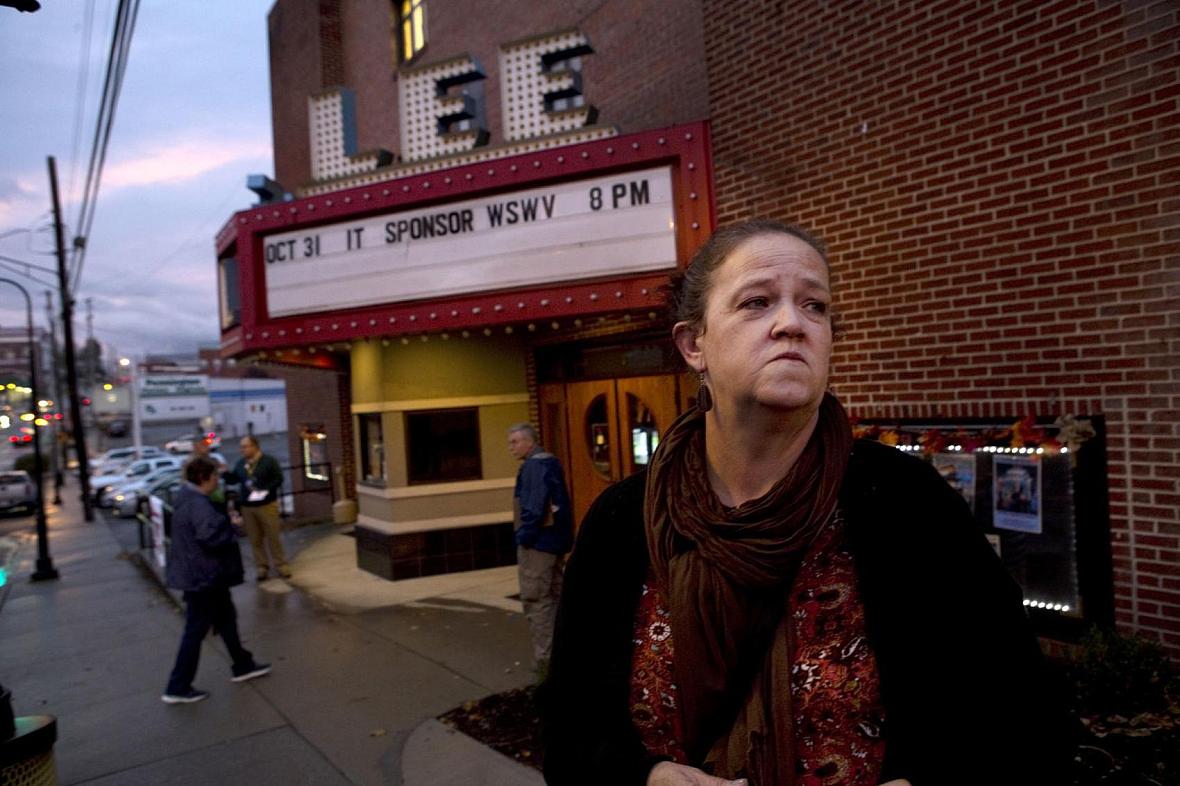
By the summer of 2017, Lee County residents had been without a hospital for four years, and local officials were under increasing public pressure to find a partner to reopen the building.
People living in one of Virginia’s poorest, most isolated counties had chipped in whatever they could afford to help buy back their hospital building, and they were convinced that they continued to lose family, friends and neighbors for lack of emergency care.
The hospital authority had two proposals on the table.
One came from Americore Health, a Florida startup that had been wooing Lee County for nearly a year. The company had no expertise in health care, had yet to show details of its promised financial backing, and had missed payroll at a Kentucky hospital it had just acquired. CEO Grant White promised a full-service hospital and a new model of care that could succeed in rural America with a business plan that called for nearly $34 million a year in lab billing.
The other proposal came from Mountain States Health Alliance, one of two hospital systems then operating in Virginia’s coalfields. The other, Wellmont Health Systems, had closed the hospital in 2013. The two systems planned to merge and form Ballad Health. The very mention of the name Wellmont in Lee County raised hackles, and although the merger had yet to go through, for some, the distrust felt for one system morphed into feelings toward the other.
Mountain States presented its financials and offered to immediately provide an urgent care facility while it worked to open an emergency room. It agreed to study whether the county could financially support a hospital.
The commissioners, in a split vote, went with Americore.
“They just got desperate. I remember one saying it’s the only game in town, or the only chance we’ve got, but really that wasn’t true,” Chairman Ronnie Montgomery said. “If you can’t find out anything about anybody, and just to let someone new walk in here and promise you the damn moon, I’ve been down that road too many times. If it sounds too good to be true, it usually is.”
When he and two other commissioners saw they would be in the minority, they pressed for performance bonds. They lost that vote, too.
Their skepticism was proven just, and on Thursday, the commissioners ratified Montgomery’s action of sending Americore notices of default. Americore had failed to get the hospital licensed and opened by the state’s Dec. 31 deadline.
Lee County Hospital Authority attorney Jeff Mitchell (left) and Vice Chairman Ronnie Montgomery talk following a November meeting when Americore CEO Grant White said the hospital would open on time despite no visible progress. (Photo Credit: Heather Rousseau/The Roanoke Times)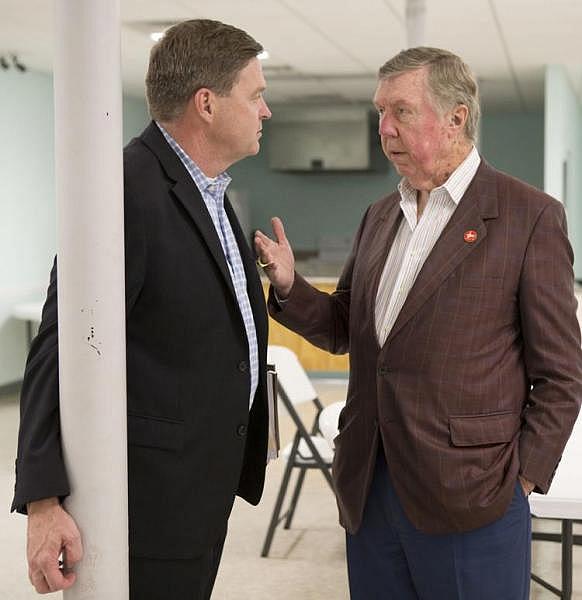
The company had stopped working on the building during the summer when its creditors filed suit in New York and sought to freeze its bank accounts with PNC. The bank in court documents said one account was overdrawn by six figures, so it should be first in line for repayment.
In its defense, Americore called the lenders predatory, claiming they violated usury laws and should have known they couldn’t all collect from the same daily receipts.
By then, Americore was missing payrolls in Kentucky and at a hospital in Pennsylvania, where it would also fall delinquent in utility and tax bills, according to Pennsylvania media. News outlets also reported last week that investigations are underway by the district attorney’s office and the federal Bureau of Labor.
Lee County residents in November continued to turn out for Lee County Hospital Authority meetings and had hoped to get answers to questions about Americore’s finances and ability to open the hospital. (Photo Credit: Heather Rousseau/The Roanoke Times)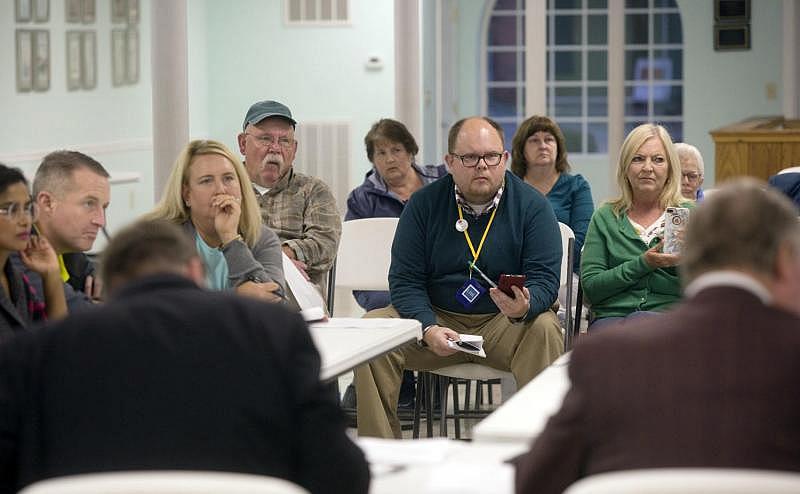
Grassroots effort
Lee County forms Virginia’s farthest southwest corner. The county seat of Jonesville is closer to eight other state capitals than it is to Richmond and is a four-hour drive from Roanoke. About 25,000 people make their home in the mountains. Its major employers are a Walmart, a federal prison and the local government — and, until it closed, the hospital with its 140 jobs.
Without a hospital, the county has a hard sell in convincing others to invest in starting businesses there. The first hospital opened more than 70 years ago on a hill over Pennington Gap. Later, the county built a new one with room for 70 inpatients off the main road, and added medical offices.
The hospital went through a string of owners. Wellmont bought it in a package deal in 2007 and then six years later, without warning, closed it.
In 2013, Lee County was one of 80 communities across the country to have lost their hospital in the previous three years. But the people in Lee County did what few have attempted: They vowed to reopen their hospital.
County supervisors created the hospital authority. They held public hearings to convince Virginia to grant them what is called a Certificate of Public Need, and they engaged in difficult negotiations with Wellmont to buy the building for $1.6 million.
Wellmont insisted on a stipulation that said Lee County’s hospital authority could not sell or partner with any other health system without giving it the right of first refusal. Wellmont would not relinquish that hold until July 2016.
The Lee County Regional Medical Center in Pennington Gap was closed by Wellmont Health System in 2013. The hospital authority in 2017 partnered with Americore Health to reopen it. (Photo Credit: Heather Rousseau/The Roanoke Times)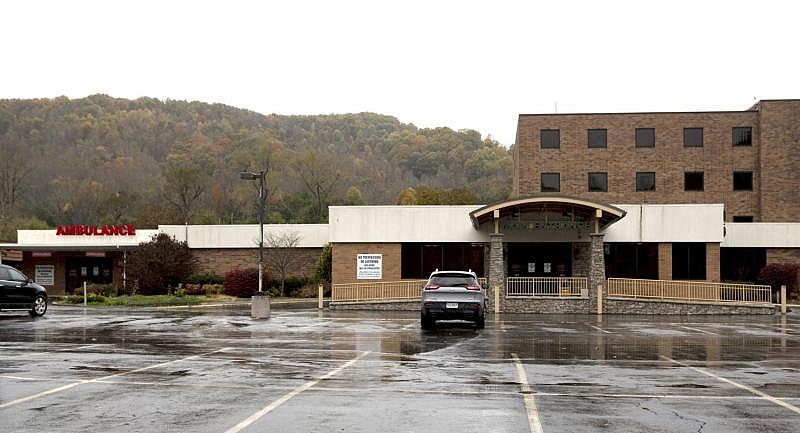
A brand-new business model
Grant White and his 13-year-old daughter drove into Pennington Gap in the summer of 2016. White was scouting for failing rural hospitals to purchase.
He was living in Florida, where he had moved after losing his job as CEO of a Canadian firm, Quantum International. The company had sold subscription receipts to finance the purchase of a number of U.S. health companies. The deals collapsed in October 2015, and Quantum issued a statement, under Canadian Stock Exchange rules, that it could not cover the return of investors’ funds.
White talked about his passion for rural health care, his investors, his alliance with health care leaders and his strategy for creating a new, profitable model of health care. The authority commissioners were intrigued and in October of that year entered into a letter of intent to lease the building to Americore for 20 years. They gave Americore a few months to present its business and financial plans.
That had yet to occur by the summer of 2017. By then, White’s history with Quantum had come to light, as had word that Americore had missed paying Kentucky employees on time.
White continued to talk with the authority about his passion for health care and for them. He talked of how on his first visit there with his daughter, a woman stood up and said her best friend had died because it took an hour and 15 minutes to get to an emergency room.
“That is something that could be easily cured. I know I have a business model that could open that hospital and make it profitable. I’m 100 percent sure of that. So I looked at my daughter who was crying over this story, and I said, ‘I’m going to get this place reopened,’” he said in a 2017 interview.
His emotion-packed words reflected those of the people in Lee County, who thought White understood their plight. They were also convinced of his sincerity, as Americore had carried the vacant hospital’s electricity bill during the year of negotiations.
Commissioners voted to sell Americore the building for $2 million, with $500,000 credited for funds already spent, and the balance would be due in three years. The county had placed a $1.6 million lien against the property to regain what it had paid Wellmont, and it agreed to take second position so Americore could gain financing for the project.
Lee County Hospital Authority Vice Chairman Ronnie Montgomery (left) and authority attorney Jeff Mitchell during a meeting in November talk with Americore CEO Grant White by conference call. (Photo Credit: Heather Rousseau/The Roanoke Times)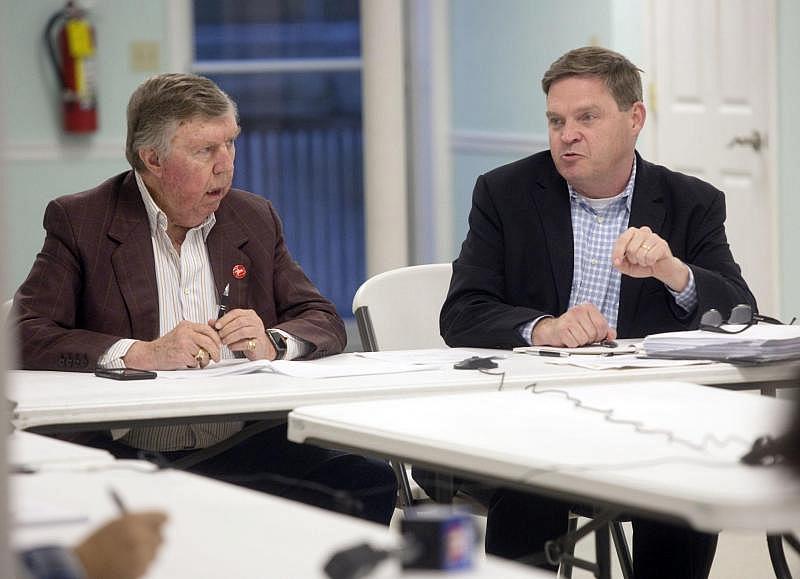
‘Secret sauce’
White has not answered emails and texts seeking an interview since September, and his voicemail does not accept messages.
White said in past interviews that he wanted to do health care in a different way that would succeed in rural areas and that would not be reliant on Medicare and Medicaid funding.
Asked to explain his business model in a 2017 interview, White said: “I can’t give you all the secret sauce formula because we are very confident in it. We obviously have acute-care hospitals that are dependent on Medicare and Medicaid, but if that is your sole business model in these locations, you’re going to starve. What I’m saying is you have significant other service lines we’re bringing to these locations to utilize excess real estate space, as well as better take advantage of the services the hospital provides.”
White did provide the authority with an Excel spreadsheet that projected revenues would be $44.3 million by the second year of operations in Lee County. Of that, $33.9 million would come from lab services.
Those figures raised concerns with at least one hospital commissioner. Tom Clarke, who runs a Roanoke-based health care company, thought the lab revenue percentages seemed too high for a hospital of that size. Clarke had been reading reports just coming to light of Anthem and other insurers filing suits alleging fraudulent billing schemes against other rural hospitals.
Those hospitals had been distressed and were failing before being bought by other Florida developers that then appeared to use the hospitals’ higher reimbursement rates to bill insurers for high volumes of testing for illicit drugs.
Americore’s proposal also relied heavily on toxicology testing.
In a September interview, White said his hospitals were not involved in pass-through billing schemes.
“We do something called an outreach program, but we don’t do it in any way, shape or form like the people you read about in the news,” he said. “We’ve been audited by the payers. We work with the payers to provide a far better service offering than other people. We are not abusing the payer contracts, I guess that’s the best way to describe it.”
White said the labs at Americore’s hospitals run all of the tests for which they bill.
“It’s pretty clear we’re not doing the things they are doing. Otherwise we wouldn’t be having the other problem,” he said.
Into default
Throughout the fall of 2018, White would tell the authority that his troubles elsewhere wouldn’t delay progress in Lee County. Commissioners waited but saw that work had not resumed.
They pressed for details as to when equipment would be ordered and installed, when the building would be ready for licensing inspections, when employees would be hired.
The authority designated commissioners Howard Elliot and Diana Pope to keep in daily contact with Americore. That didn’t work. Meetings were called. White would call in on a conference line.
“What about the money, Grant?” Pope pressed in November.
He responded then that they could still get the hospital open on time.
Within weeks, it was clear that would not occur. And by year’s end, equipment and furnishings had been moved out of the building and Americore was not responding to the authority.
Montgomery sent letters of default, and negotiations are now underway to determine the value of improvements Americore made to the building. There is a lien for about $1.3 million that will need to be satisfied.
The authority does not have funds of its own. It plans to meet Monday to approve a settlement proposal that it will send to the county supervisors.
And then it is back to finding a partner. Virginia’s health commissioner agreed earlier this month to give Lee County four more years to open the hospital.
“I want to make it clear, in no case do we expect or intend to need the four years,” Elliot said.
The commissioners think they might have more suitors this time around since Virginia has expanded Medicaid for adults, meaning there will be far fewer patients without insurance.
Ballad is required under the terms of the Wellmont-Mountain States merger to provide essential services in Lee County if the authority is unable to open the hospital. The health system said in a statement Friday it “is committed to serving the residents of Lee County and is willing to assist Lee County leaders in their efforts to ensure health care access for the people they serve.”
Alan Levine, president of Ballad Health talks about the merger between Mountain States Health Alliance and Wellmont Health System, which created Ballad Health. While in his Johnson City, Tennessee office on August 31, 2018, Levine addresses key initiatives Ballad plans to take to serve the population of southern Virginia. (Photo Credit: Heather Rousseau/The Roanoke Times)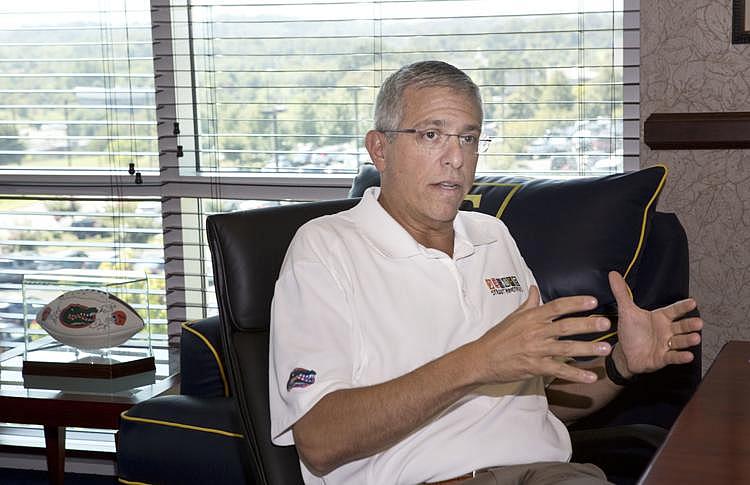
But there remains the question of whether Lee County would welcome Ballad’s assistance, as people still harbor ill feelings toward Wellmont.
Ballad CEO Alan Levine, who came from Mountain States, said in a recent interview that he doesn’t understand the distrust.
“We were the ones that were the most honest with them when we said you don’t have enough population to support a full-service hospital. That’s why these rural hospitals are closing — and we didn’t close that hospital, by the way,” he said.
“When we made this proposal, we shared the financials, we showed them the needs, we gave them a timeline of when we would get the ER approved by the commonwealth. What I think it was, that may have been one reason they gave you, they had another person at the table saying no, no, no, we can give you a hospital. And if I were them, and I heard that, I’d say, that is great. These are not people who understand how it works with this whole lab thing. These are lay people who don’t understand the implications of that. If I were in their shoes I may have seen the same. They came in and said you could have a hospital, and you had us saying you can’t support a hospital.”
[This story was originally published by The Roanoke Times.]

